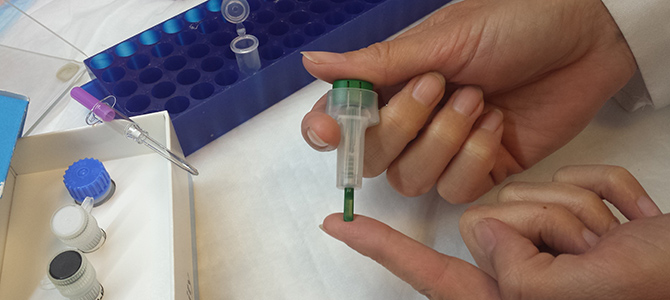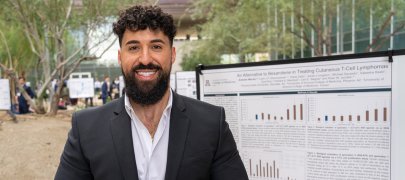
UA Scientist in Phoenix Helping Develop Test for Monitoring Biological Effects of Radiation, Could Save Lives

Simple Blood Test Could be Used By Astronauts, Cancer Patients to Check Radiation Exposure
Imagine a simple blood test that could confirm just how much radiation was reaching your cancerous tumor, or just how much radiation exposure an astronaut is receiving on a mission to Mars.
A University of Arizona College of Medicine – Phoenix faculty member is part of team that is developing cutting-edge tests that eventually could be used in just that fashion.
“We are that much closer to having a test that could be used to measure the amount of radiation being focused on a particular body area, which could save lives in the event of a radiological accident, or for better assessing the radiation dose delivered to a specific tissue providing more precise treatment of cancer,” said Frederic Zenhausern, PhD, MBA. “But this could also help in better understanding the biological mechanisms of tissue resistance to radiation and other effects.”
The research is part of the university’s overall effort to advance initiatives in precision health, which aims to improve delivery of specific treatments and preventative measures in relation to the unique aspects of each patient and their individual disease process.
Zenhausern is part of a team, led by researchers at Duke University in Durham, N.C., that was recently awarded an additional $10.4 million contract to continue its advancement of the radiation exposure blood test. The award comes from the Biomedical Advanced Research and Development Authority (BARDA), a division of the U.S. Department of Health and Human Services. For more information about the grant, visit Duke Medicine.
The Center for Applied NanoBioscience and Medicine, run by Zenhausern, pioneered radio-genomic studies in Arizona, which resulted in several grant awards from federal agencies. Over the years, the team also worked with international clinical groups and hospitals to develop multiple molecular-based diagnostic tests that ultimately can be used by individuals and public health systems to facilitate improved, precise treatment.
About the College
Founded in 2007, the University of Arizona College of Medicine – Phoenix inspires and trains exemplary physicians, scientists and leaders to optimize health and health care in Arizona and beyond. By cultivating collaborative research locally and globally, the college accelerates discovery in a number of critical areas — including cancer, stroke, traumatic brain injury and cardiovascular disease. Championed as a student-centric campus, the college has graduated more than 800 physicians, all of whom received exceptional training from nine clinical partners and more than 2,700 diverse faculty members. As the anchor to the Phoenix Bioscience Core, which is projected to have an economic impact of $3.1 billion by 2025, the college prides itself on engaging with the community, fostering education, inclusion, access and advocacy.


